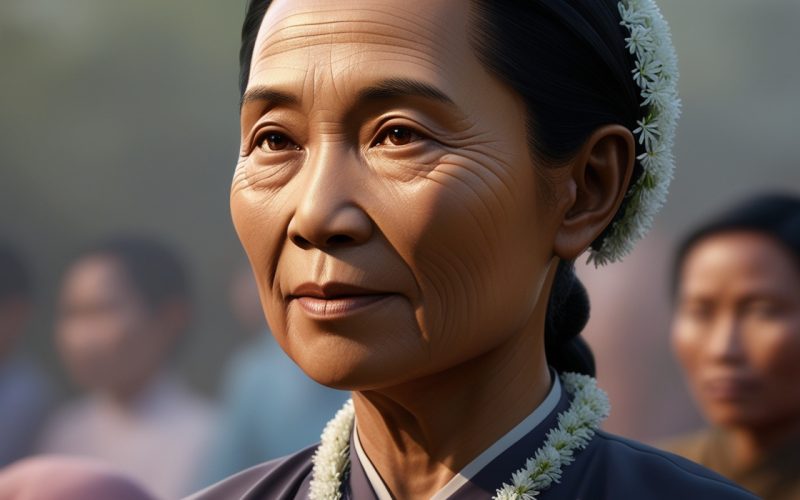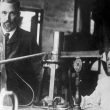Table of Contents Show
I. Born of Revolution: The Legacy of Aung San
Aung San Suu Kyi was born on June 19, 1945, in Rangoon, Burma, into a world of upheaval and change. Her birth coincided with a crucial moment in Burmese history, a time when the country was teetering on the edge of independence after years of British colonial rule. Her father, Aung San, was the architect of this impending freedom, a revolutionary leader whose name was etched into the very fabric of Burma’s identity. Aung San was not just a soldier, but a visionary, who saw beyond the immediate struggle for independence to the future of a united and peaceful nation. He was a man of principle, courage, and conviction, qualities that would come to define his daughter’s life.
Aung San’s assassination in July 1947, when Suu Kyi was just two years old, left an indelible mark on her life. His death was a national tragedy, one that left the country bereft of its most capable leader on the eve of its independence. For Suu Kyi, the loss was both personal and profound. Though she was too young to remember her father, his legacy loomed large over her childhood, shaping her understanding of duty, sacrifice, and leadership. She grew up in a household steeped in the ideals of her father’s revolution, under the guidance of her mother, Daw Khin Kyi, who herself became a prominent figure in Burmese public life, serving as the country’s ambassador to India.
Suu Kyi’s early education took place in Burma, but her mother’s diplomatic postings eventually took the family abroad. She was educated at the best schools in India and later at Oxford University in England, where she studied philosophy, politics, and economics at St. Hugh’s College. The years spent in the West broadened her worldview, exposing her to different cultures and political systems, but they also deepened her understanding of her own country’s struggles. At Oxford, Suu Kyi met Michael Aris, a British scholar specializing in Tibetan and Himalayan studies. The two married in 1972, and Suu Kyi settled into a quiet life in England, raising their two sons, Alexander and Kim.
Yet, even as she lived far from Burma, Suu Kyi could not escape the pull of her homeland. The legacy of her father and the unfinished business of Burma’s independence remained with her, a constant reminder of the responsibilities she carried. Her life in England, while fulfilling in many ways, was marked by a sense of incompleteness, a feeling that her destiny lay not in the tranquil halls of academia, but in the turbulent streets of Rangoon.
II. Return to Burma: The Call of Duty
In 1988, Aung San Suu Kyi’s life took a dramatic turn. She returned to Burma to care for her ailing mother, but what she found upon her arrival was a country in turmoil. After decades of military rule, Burma was in the throes of a popular uprising against the authoritarian government. The streets of Rangoon were filled with students, monks, and ordinary citizens demanding an end to military rule and the establishment of a democratic government. The protests were brutally suppressed by the military, but they also marked a turning point in Burma’s history, as the people’s desire for change became undeniable.
Suu Kyi could not remain on the sidelines. She was her father’s daughter, and the call to lead her people in their struggle for democracy was one she could not ignore. She quickly became the face of the opposition, founding the National League for Democracy (NLD) and advocating for nonviolent resistance against the military regime. Suu Kyi’s speeches, delivered with quiet determination and moral authority, resonated deeply with the Burmese people, who saw in her the embodiment of their hopes for a better future.
The military junta, however, saw her as a threat. In July 1989, just a year after she had returned to Burma, Suu Kyi was placed under house arrest. The regime believed that by silencing her, they could crush the burgeoning democracy movement. But they underestimated the depth of her resolve and the strength of the support she commanded. Even in captivity, Suu Kyi remained a powerful symbol of resistance. Her imprisonment became a rallying point for the Burmese people and garnered international attention. The world began to take notice of the woman who was standing up to one of the most repressive regimes in the world.
In 1990, the military regime, confident that it had neutralized Suu Kyi and her movement, allowed national elections to take place. The NLD won a landslide victory, capturing 80% of the parliamentary seats. But the junta refused to recognize the results, and Suu Kyi’s house arrest continued. For the next two decades, Suu Kyi would spend the majority of her time in isolation, cut off from her family, her supporters, and the outside world. Yet, even in this enforced solitude, her influence only grew. She became an international icon of the struggle for democracy, earning comparisons to figures like Nelson Mandela and Mahatma Gandhi.
Suu Kyi’s unwavering commitment to her principles, despite the immense personal cost, earned her the admiration of millions. In 1991, she was awarded the Nobel Peace Prize, a recognition of her nonviolent struggle for democracy and human rights. In her acceptance speech, delivered in absentia by her son Alexander, Suu Kyi spoke of the power of truth and the importance of standing up against injustice, no matter the odds. Her words echoed around the world, reinforcing her status as a moral beacon in a time of darkness.
III. The Long Road to Freedom: A Nation in Transition
The years that followed were a period of both hope and frustration for Aung San Suu Kyi and the people of Burma. The military regime, under increasing international pressure, began to make tentative steps toward political reform. In 2010, Suu Kyi was released from house arrest, an event that was met with jubilation both in Burma and around the world. The junta announced a series of political reforms, including the holding of parliamentary elections in 2012. While these moves were seen as a positive step forward, they were also viewed with skepticism by many who doubted the military’s commitment to genuine democratization.
Suu Kyi, however, chose to engage with the process. She re-entered the political arena, leading the NLD in the 2012 by-elections. The party won 43 of the 45 contested seats, and Suu Kyi herself was elected to parliament, marking her first official role in the government of Burma. Her election was a moment of triumph, the culmination of decades of struggle, and a testament to the enduring power of her ideals.
But the transition to democracy was fraught with challenges. The military retained significant power under the new constitution, including control over key ministries and a guaranteed 25% of parliamentary seats. Suu Kyi’s ability to enact meaningful change was constrained by these institutional limitations, as well as by the deep-seated corruption and inefficiency that pervaded the Burmese government. Yet, she remained committed to the cause, believing that gradual reform was the only way to achieve lasting peace and stability in Burma.
In 2015, the NLD achieved a historic victory in the general elections, winning an outright majority in both houses of parliament. Suu Kyi, barred from the presidency by a constitutional clause specifically designed to exclude her, took on the newly created role of State Counsellor, effectively becoming the de facto leader of the country. Her rise to power was hailed as the dawn of a new era for Burma, a moment when the long-suppressed dreams of democracy finally seemed within reach.
Suu Kyi’s government focused on a range of issues, from economic development and education reform to national reconciliation. She also sought to address the long-standing ethnic conflicts that had plagued Burma for decades, initiating peace talks with various ethnic armed groups. However, the complexities of Burma’s political landscape, combined with the lingering influence of the military, made progress slow and difficult. The challenges were immense, and Suu Kyi’s leadership was put to the test as she navigated the delicate balance between maintaining her moral authority and engaging with a deeply flawed system.
IV. The Rohingya Crisis: A Moral Dilemma
As Aung San Suu Kyi’s government sought to steer Burma through its democratic transition, a crisis emerged that would come to define her legacy in a way few had anticipated. In 2017, the world’s attention turned to the western state of Rakhine, where a brutal military crackdown against the Rohingya, a Muslim minority group, led to widespread atrocities. Reports of mass killings, rape, and the burning of villages shocked the international community, and nearly a million Rohingya fled to neighboring Bangladesh, creating one of the largest refugee crises in the world.
For many, the most shocking aspect of the crisis was Suu Kyi’s response, or rather, her lack of one. As reports of the atrocities mounted, Suu Kyi remained silent, refusing to condemn the military’s actions. Her government denied the allegations of ethnic cleansing and insisted that the military’s actions were a legitimate response to attacks by Rohingya militants. This stance was met with widespread criticism, as former allies and admirers of Suu Kyi expressed their disappointment and dismay.
Suu Kyi’s silence on the Rohingya crisis was seen by many as a betrayal of the principles she had stood for throughout her life. The woman who had once been a global symbol of moral courage and human rights was now accused of turning a blind eye to ethnic cleansing. The Nobel Peace Prize laureate found herself increasingly isolated on the world stage, as international organizations and governments called for her to take action to stop
he violence and protect the Rohingya people. Prominent figures, including former U.S. President Barack Obama and former UN Secretary-General Ban Ki-moon, expressed disappointment in Suu Kyi’s lack of leadership during this humanitarian disaster.
As the crisis deepened, the complexity of Suu Kyi’s position became apparent. While she had the title of leader, the military remained a powerful force within the government, and her ability to influence its actions was limited. Suu Kyi faced a moral dilemma; to speak out against the military risked destabilizing the fragile political situation and potentially igniting further violence. Yet, remaining silent left her increasingly vulnerable to criticism, and many felt she had compromised her own values to maintain a precarious balance of power.
Her government attempted to manage the narrative, promoting the idea that the situation was exaggerated by foreign media and framing the Rohingya issue as a national security threat. This approach further alienated the Rohingya and failed to acknowledge their suffering, leading to widespread condemnation from human rights groups and activists around the world. The hope that had surrounded Suu Kyi’s rise to power began to dissipate, as her administration became synonymous with inaction and complicity in the violence.
As Suu Kyi’s reputation declined internationally, the once-unified support she had garnered from the Burmese populace began to fracture. While many of her core supporters remained loyal, segments of the population started to question her leadership. The ethnic conflicts that had long been a source of division in Burma re-emerged, complicating her efforts to build a cohesive national identity. The rising tide of nationalism, fueled by anti-Rohingya sentiment, presented a paradox for Suu Kyi, who had long advocated for peace and reconciliation.
In an effort to salvage her image, Suu Kyi embarked on diplomatic missions, engaging with leaders from various countries, including Japan and China, in hopes of attracting investment and support for her government. However, the international community’s disapproval of her handling of the Rohingya crisis overshadowed these efforts, leaving her with a tarnished legacy and a divided nation. The struggles she faced were a stark reminder of the complexities inherent in leadership, especially when grappling with deeply ingrained societal issues.
V. Legacy and Reflection: The Complex Nature of Leadership
Aung San Suu Kyi’s journey from the daughter of a revolutionary to the leader of a nation is a testament to the challenges and responsibilities that come with power. Her early years were marked by hope, resilience, and a commitment to democratic ideals, but her later tenure as leader of Burma revealed the intricate, often painful realities of governance. The Rohingya crisis and her response to it will undoubtedly be central to her legacy, complicating the narrative of a woman who once inspired millions with her courage and vision.
As Burma continues to grapple with its complex identity, Suu Kyi’s story serves as a microcosm of the broader struggles within the nation. The road to democracy is rarely straightforward, and the choices made by those in power can have far-reaching consequences. Suu Kyi’s experience highlights the often-painful reality that leadership involves navigating competing interests, values, and expectations—a balancing act that can lead to both triumphs and failures.
Her legacy remains contested and multifaceted. For some, she is a symbol of hope, a leader who emerged from the shadows of oppression to lead her people toward democracy. For others, she is a figure of disappointment, whose inaction in the face of human rights abuses has tarnished her reputation. As history unfolds, it will be essential to recognize the complexity of her journey, understanding that the pursuit of justice and democracy is fraught with moral dilemmas and difficult choices.
Ultimately, Aung San Suu Kyi’s life is a testament to the power of resilience and the challenges of leadership in a nation struggling to define its identity. The ideals she once embodied continue to resonate in the hearts of many who still dream of a free and democratic Burma. Her story is not just one of triumph and tragedy; it is a reflection of the complexities of the human experience, the enduring struggle for justice, and the timeless quest for freedom in the face of adversity. As Burma moves forward, it will be imperative to grapple with the lessons of Suu Kyi’s life, recognizing the importance of moral courage, integrity, and the unwavering pursuit of justice for all.








